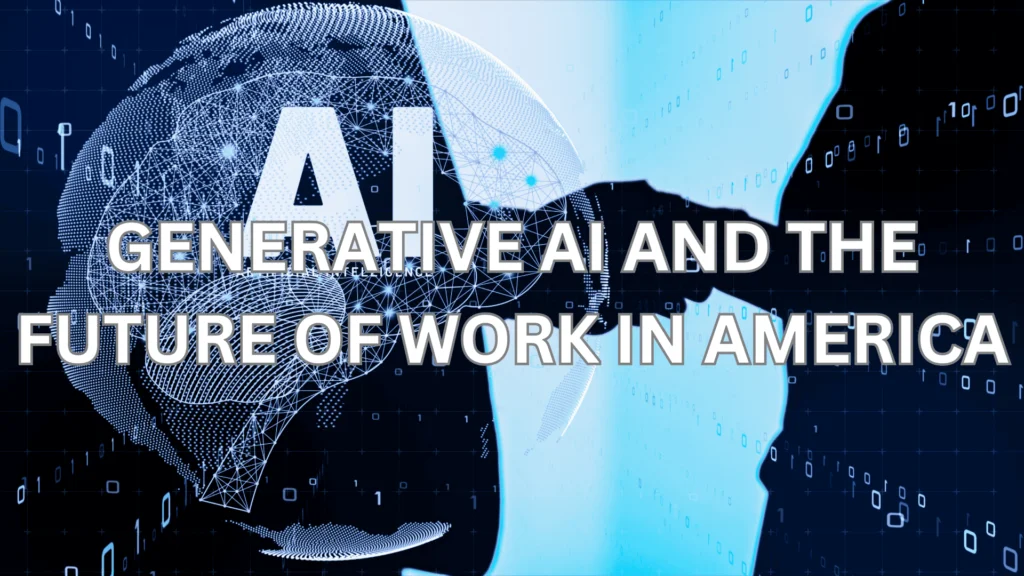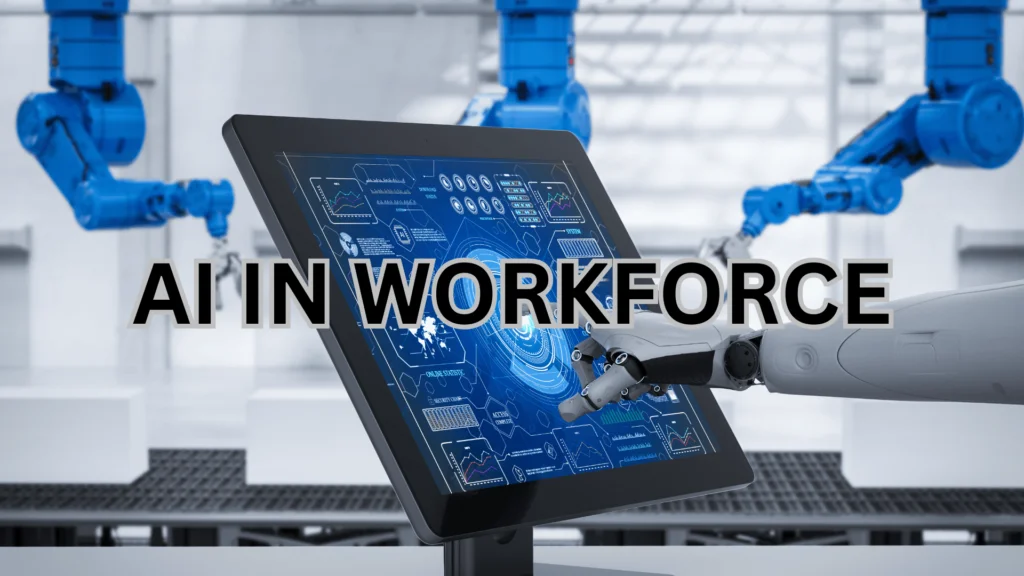Generative AI and the Future of Work in America: A Revolution
An Overview of Generative AI and the Future of Work in America
Generative AI is greater than just a tech catchphrase. It’s remodeling industries, forging new careers, and compelling us to rethink generative AI and the future of work in America. But here’s the kicker: while AI is growing rapidly, the future of work is still fundamentally human. This recent era isn’t about robotized rule—it’s about teamwork between people and machines.
Want to know what’s in the job market because of AI? Find out more here.

Generative AI and the Future of Workforce in America: Shifting Jobs, But Not Replacing Them
When people listen to “AI,” a lot of times they imagine potential job losses or a dire future in which machines carry out every task. But that’s not the reality. Generative AI in the workforce will modify jobs instead of abolishing them immediately. The development of AI in workforce is centered around giving people the necessary skills to succeed in collaboration with AI.
We are stepping into a period where technology doesn’t mitigate human capacity; it enhances it. Think about a workplace in which AI handles ordinary, repetitive work, thus enabling humans to concentrate on innovative, strategic, and emotional tasks—exactly the sorts of tasks that machines are unable to do effectively. Generative AI will lead to an uptick in jobs, but they’ll call for new skill sets.
Generative AI in The Future of Work in America is Human: Here’s Why
Let’s be clear: In spite of the fact that AI can write a poem or come up with a logo, it does not have the ability to reflect human empathy, critical thinking, or leadership. The reason the future of work emphasizes humanity is that. What makes us different—our creativity, problem-solving skills, and emotional intelligence—are more needed than they have ever been.
Let’s look at customer service as a case in point. While AI is able to deal with common questions, it’s the human aspect that eases a situation when a frustrated caller is on the line. While AI is capable of aiding in disease diagnosis, the compassion of a nurse or physician is what helps a patient feel their care is important. There are tasks that only humans can perform.
How to Prepare for AI Takeover: Adaptation is Key
The thought of AI ‘taking over’ may be alarming, but the nuanced truth is something different. How to prepare yourself for an AI takeover? It’s simple: adapt. Being competitive in this changing landscape relies on both upskilling and reskilling.
As an example, if you are in marketing, AI will accelerate your data analysis, though it won’t generate a story that resonates emotionally with your audience. Any software developer must learn how to operate with generative AI models. Being aware of AI examples in the workplace—like implementing AI for data analysis or automating repetitive workflows—can give you a significant benefit.
What should you undertake to get yourself ready? Here are a few steps:
- Invest in Lifelong Learning: Make use of online education, training workshops, and certifications in subjects including AI, data science, and those related to humanistic skills.
- Develop Soft Skills: AI cannot replicate emotional intelligence, creativity, nor leadership skills.
- Stay Flexible: Welcome career pivots as industries alter and new job positions in AI come to light.
Jobs in Generative AI: The New Frontier in the Future of Work in America
Even though AI serves to automate a variety of tasks, it is also developing entirely new areas. Posts for jobs in generative AI and the future of work in America are showing up everywhere—from the design of AI models to carefully leading the application of AI in industries including healthcare and education. This applies to more than just coders and engineers; creatives, marketers, and analysts will uncover a wealth of opportunities, also.
Here are a few emerging roles that didn’t exist a decade ago:
1. AI Ethicist: As the responsibility for decision-making shifts to AI, we need to have people who can steer the ethical influence of these systems.
2. Prompt Engineer: Fine-tuning AI models, including ChatGPT, for better response generation, especially in unique industries, is part of this role.
3. AI Trainer: Training AI systems require people to manage data sets and lead machines toward smarter learning.
These occupations represent the very start of what’s possible. The development of AI in the evolution of the workforce means that emerging job types will continue to appear, many of which are not yet on our radar.

AI in the Workplace Examples: Real-World Integration
Interested in how AI has already started changing workspaces? Here are some AI in the workplace examples that show the real-world integration of generative AI:
- Finance: AI technology helps banks uncover fraud, automate transactions, and create forecasts of market trends. Still, people, who are human analysts, interpret these findings and create strategic decisions.
- Marketing: AI technologies can draft product descriptions, examine consumer information, and guess trends, but marketers are still in control of the creative strategy and engage with their audience on an emotional level.
- Healthcare: While AI supports diagnostics, doctors and nurses are still necessary for patient care and for handling intricate cases that call for a human approach.
- Manufacturing: AI automates the assembly lines, but it’s humans who oversee the operations, address problems, and make decisions that call for critical thinking.
These examples highlight one key truth: AI acts as a tool, not as a substitute for human workers.
The Evolving Job Market: Future Prospects and Possibilities
Since generative AI is changing the nature of work and workplaces it is important to understand how the job market is affected. Even though it is certain that some positions will become extinct, new jobs are on the rise, and calling for a new approach to work.
Job Creation in New Sectors
Advanced generative technology is creating new industries and sectors in society that were unheard of before. For instance, with the climate of organizations embracing AI-entailed tools, new positions linked to AI ethicists, AI trainers, and AI auditors have emerged. The former throws the door wide open for professionals who have an aptitude for managing and interpreting these outputs, as well as guaranteeing that these are ethical in nature.
Transformation of Traditional Roles
The nature of work tasks is rapidly changing, Many jobs are not disappearing but are being adapted. For example, roles in areas like marketing or finance are being improved with the usage of AI, which can help streamline duties and leave the more important work to the professional working in that area. This evolution means that the workers have to change their working patterns and use AI to upscale their output.
The Demand for Hybrid Skill Sets
In the future job market, employers will value advanced technical skills that are complemented by strong interpersonal skills. Thus, employers will look for people, who not only know how to interact with AI technologies, but also demonstrate good communication, creative, and critical thinking abilities. The combination of these is that the workers will be able to work with the AI and make decisions based on the data the AI has produced.
Flexibility and Remote Work
Firstly, generative AI has intensified tendencies toward working from home or in general, a flexible workplace. It has also given employers the opportunity to select workers from a global pool while on the other hand, workers can also select their employers. The flexibility can be beneficial for work-life balance, however, it comes at the cost of having to learn new ways of communication and cooperation.
Navigating Job Displacement
As exciting as generative AI might sound, it raises issues, especially as it pertains to employment loss. Employees who maybe engaged in repetitive tasks within their industries may be susceptible to being replaced. This is why it is important for people to be aware of the changes that are happening in the field and go on the lookout for upskilling to enable them to fit in this changed world of working.
In future the job market will experience severe transformations as generative AI enters the world of employment. Possible benefits as well as risks associated with the emerging trends can help the worker to approach a new world of work that seems to require flexibility, innovation, and collaboration with technology.
This Future Isn’t Years Away—It’s Upon Us
It’s not just that Generative AI is not a long way off; it’s currently changing industries and our work styles. But here’s the heart of it: the future of work is human. Though AI can augment our skills, it is incapable of taking away what uniquely defines us as human. It’s a strong tool that will direct industries, careers, and the economy, yet people will continue to be integral.
America is ready to take charge of this transformation, but it requires an alteration in our thinking about work. We need to quit seeing AI as an adversary and should reframe it as a teammate—a method to amplify our capabilities instead of replacing them. This transition won’t materialize quickly, although those who make the shift will succeed.
What future prospects are awaiting? It’s an atmosphere in which machines oversee the ordinary, allowing humans to pursue creativity, innovation, and empathy. Geared towards AI workforce development means getting people ready for jobs that we cannot yet fathom.
Generative AI in the future of work in America, the future of work focuses not on choosing one over the other, between humans and AI, but on forging a partnership that allows them both to shine. And the future is currently at hand.
The Bottom Line on Generative AI and the Future of Work in America
In conclusion, the narrative surrounding Generative AI and the future of the workforce in America isn’t one of machines taking over from humans. This is the tale of human beings using machines to achieve new milestones, catalyzing creativity, solving major problems, and creating a future that’s more dynamic and more focused on human experience than ever before. The future workforce is going to be one that sees human potential and AI innovation prosper together.